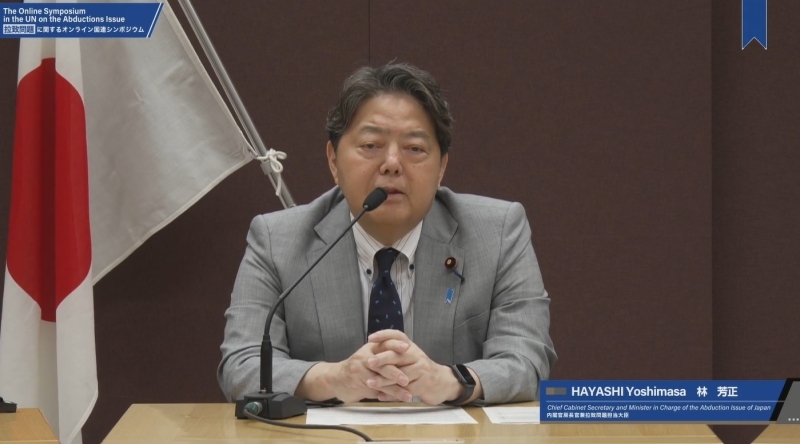Keynote Remarks by H.E. Mr. HAYASHI Yoshimasa, Chief Cabinet Secretary and Minister in charge of the Abduction issue, at the Online Symposium in the UN on the Abductions Issue
2025/6/26

Distinguished Guests, Ladies and Gentlemen,
I am HAYASHI Yoshimasa, Chief Cabinet Secretary and Minister in Charge of the Abduction Issue. On behalf of the Government of Japan, I would like to extend my heartfelt appreciation to our co-hosts—the United States, Australia, the Republic of Korea, and the European Union as well as to the United Nations officials for their invaluable cooperation in organizing today’s symposium. I also wish to thank all of you who are participating in or viewing this event.
To date, the Government of Japan has officially identified 17 Japanese citizens as victims of abduction by North Korea. Moreover, there are many other missing people for whom the possibility of abduction by North Korea cannot be ruled out. Five of the abductees returned to Japan in 2002, but the other victims still remain deprived of their freedom. Their family members are aging and passing away, one by one. In February of this year, Mr. ARIMOTO Akihiro passed away. He was the father of Ms. ARIMOTO Keiko, who was abducted in 1983 while staying in Europe. He was 96 years old and devoted his life to rescue his daughter until his very last days. His unwavering determination spurred me every time I met him. The Government of Japan takes the current situation very seriously.
Today, not only from Japan, but also from the United States and Thailand, families who have been tirelessly working on this issue, are joining us on stage. The 2014 report of the UN Commission of Inquiry on human rights in the DPRK referred to victims of abductions from ten countries other than Japan. The abductions issue is a violation of fundamental human rights that must be universally protected. Resolving this issue requires the international community to coordinate closely with each other and demonstrate a strong determination. I would like to express our deep appreciation for the continued understanding and support for the abductions issue from the United Nations and from countries and regions around the world.
Realizing the return of Japanese abductees is of course under the responsibility of the Government of Japan. Japan’s basic policy on North Korea is to achieve the normalization of relations with North Korea, in accordance with the Japan-DPRK Pyongyang Declaration of 2002, by comprehensively resolving outstanding issues of concern, such as the abductions, nuclear, and missile issues, as well as settlement of the unfortunate past. This remains unchanged.
In particular, the abductions issue, which is a humanitarian and time sensitive issue with no time to spare, must be resolved immediately. This is also indispensable in order to envision a future in which both Japan and North Korea can enjoy peace and prosperity together.
Prime Minister Ishiba expressed his intention to further intensify our efforts to engage with North Korea through various channels, stating that the two leaders must have candid talks and face squarely with issues before us to achieve a breakthrough in our relations.
The Government of Japan will continue to make every possible effort, in close cooperation with the international community, to realize the return of all abductees at the earliest time possible.
At today’s symposium, I believe we will deepen our discussions on the urgent need to resolve the abductions issue, and on the benefits this will bring to both North Korea and the international community as a whole.
Thank you very much.
